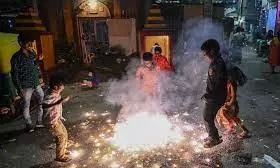
Post-Diwali firecrackers amplify air pollution in Delhi-NCR, thick smog and toxic air shroud the city
text_fieldsDelhi: The aftermath of Diwali festivities in Delhi and neighbouring regions have exacerbated air pollution concerns as the widespread disregard for the firecracker ban led to hazardous levels of air quality.
Real-time air monitoring platforms reported air quality index (AQI) figures above 500, with some areas reaching as high as 900.
Violations of the ban were evident, with iconic locations like Jawaharlal Nehru Stadium, Lajpat Nagar, and Karol Bagh recording alarmingly high AQI levels.
According to data from the Central Pollution Control Board (CPCB), the average AQI hovered around 300 at most locations, with PM2.5 and PM10 pollutant levels touching 500 in several areas. The violation of the firecracker ban in Delhi, Noida, Gurugram, and other NCR regions raised concerns about pollution, with social media visuals depicting gatherings for firecracker celebrations.
Environmentalists criticised the authorities for the failure to enforce the Supreme Court ban effectively. Environmentalist Bhavreen Kandhari expressed disappointment, stating that warnings and bans had not been adequately implemented.
Despite the Supreme Court's firm stance on the firecracker ban, including barium-containing ones, and the Delhi government's efforts, violations occurred, leading to a surge in pollution levels.
While Delhi recorded improved air quality on Diwali day, the surge in pollution after the festival, marked by the bursting of firecrackers, reversed the positive trend. The AQI reached 218 at 4 pm on Diwali, contrasting with the city's air quality over the past weeks, which had been among the world's worst.
The worsening pollution situation prompted the Delhi government to close schools and restrict the entry of diesel trucks. The ban on firecrackers, coupled with favourable weather conditions, contributed to the brief improvement in air quality before Diwali.
The city, grappling with persistent pollution issues, now faces the aftermath of Diwali celebrations, with a thick layer of smog enveloping the national capital.
The concentration of PM2.5 in Delhi has exceeded WHO limits, prompting concerns about the health and well-being of residents.





